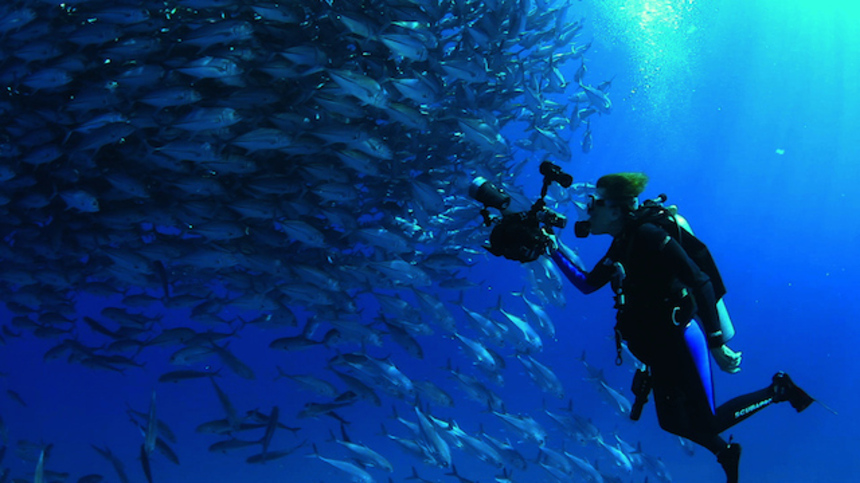Review: MISSION BLUE, A Reflection On A Single Life As A Stand-In For All Life

Here there is plenty, but the most compelling image in activist/biopic documentary, Mission Blue, is that of a lone plastic lawn chair, sparsely illuminated on the ocean floor. It is a bit of detritus found thousands of miles from land and a reminder that the consequences of our civilization of convenience and plenty, range far. This is hardly news to you, savvy filmgoer and documentary enthusiast, and director Fisher Stevens (with Robert Nixon) are aware that the audience for their film knows the ocean has been used by humanity as a vast sewer.
Thus, the intent of their documentary is to frame things in a new perspective. That is to say, collectively, we have made this colossal mess over pretty much a single lifespan. Take a minute to think about that. With no irony whatsoever, the example span, writ large, is the accomplished Marine Biologist Sylvia Earle, celebrity scientist since the 1960s who is now pushing 80 and still full of life and passion for preservation of earth and memory. But things have changed pretty dramatically since she dipped her toe into the Gulf of Mexico as a child.
Stevens, if you recall, has an Oscar for producing another piece of aquatic activism, 2010's The Cove, and here he spent three years with Earle, in wetsuits, diving off The Galapagos Islands, on the lecture circuit with bottled water, and in her memories - as a child, spouse (three husbands), mother, numerous expeditions to untouched parts of the world, and even a brief time as government bureaucrat managing The U.S. National Oceanic and Atmospheric Administration.
Mission Blue again confirms Werner Herzog's musing that exploring the deep oceans is analogous to exploring the stars. How deep is the ocean, how high is the sky. The difference is that in our terrestrial big blue, there are teeming amounts of 'alien' lifeforms, glowing and gracefully moving; things that make James Cameron's chemiluminescent CGI recreations in Avatar kindergarten stuff by comparison. Cameron and Earle respectfully tussled over who got to ride in his deep diving submersible to the bottom of the Mariana Trench a few years ago. Earle broke deep diving records via JIM suit in the 1970s, earlier, she was of the first people to live for a lengthy period of time in an underwater habitat. She lobbied the 'king of the world' to get his his tall skinny ass out of his own gear, and give her a shot at going deeper.
She burned through several marriages, had a bunch of kids, and generally shattered any 1950s or 60s notion of the domestic female, becoming a celebrated science icon along the way. She reflects on the difficult of the balancing act for family, and it's not hard to scale up the notion to how we manage the planet. Mistakes were made, and things chug along, older, more frail, but still hanging in and carrying on. It is a major plus to have the Earle do the bulk of the films voice-over; she is as complex and compelling a human being as one would expect.
She can say, "I saw the before. I saw the after," when it comes to the death of so many of the worlds great coral reefs and other vibrant parts of the planets hidden depths. The massive depletion of so many types of species of fish (Cod, Menhaden and even the mighty and feared shark) in service of feeding, often indulging, a human population that ballooned from two billion to seven billion people, happened over her lifetime.
How many sharks have people killed compared to how many people sharks have killed? A million to one ratio, most likely. And that is just fishing for the fins that are craved so much in Chinese soups. This does not even count all the dead zones in the ocean we've caused in the past 50 years: not just dumping garbage, or Exxon Valdez oil-disasters, these are almost minor compared to the run-off of farming fertilizer carried in the water table and rivers into the oceans which plays holy hell with the eco-system. If the oceans are the planets temperature regulations system, climate change is not just carbon dioxide in the atmosphere, it is also the barren spaces we've wrought; a chair with a view of the annexation of Earth's very own 'Galaxy of Life.'
OK, one can get a little depressed about this stuff, and so, like many activists docs, Mission Blue exits on a hopeful note. The eponymous organization to designate the equivalent of 20% of the ocean space as aquatic National Parks. (No drilling, no dumping, no hunting.) A fifth of the ocean allowed a breather to recover from the burden the last 100 years of human history seems reasonable and sane.
Whether or not you find this documentary didactic or obvious (humans muck up nature, it's what we do) or even a commercial for Earle's Mission Blue project, this does not change the fact that it is all clearly and compellingly presented. The discarded lawn chair is a source for almost a paralyzing melancholy, but we can just pick the damn thing up and let nature fix herself.
The film is available to watch exclusively on Netflix.
Mission Blue
Director(s)
- Robert Nixon
- Fisher Stevens
Writer(s)
- Mark Monroe
- Jack Youngelson
Cast
- James Cameron
- Michael deGruy
- Sylvia Earle
- Bryce Groark

Do you feel this content is inappropriate or infringes upon your rights? Click here to report it, or see our DMCA policy.






